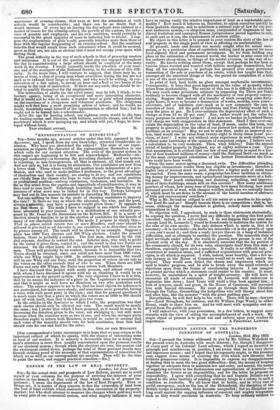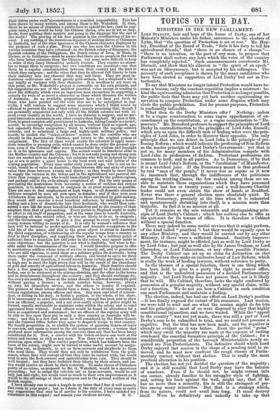POSTPONED LETTER ON THE DANGEROUS CONDITION OF AUSTRALIA.
_London, 26th May 1852.
Sris—I perused the letters addressed to. you by Mr. Gibbon Wakefield on the present crisis in Australia with much in ; for, though I disapprove of every part of his Colonial Land scheme, which I regard as incorrect in principle and mischievous in practice, I am aware that he is a very clever and ingenious person ; and I hoped that his ingenuity might, in this pressing case, suggest some means of averting the evils which now threaten that -hitherto prosperous colony. It is impossible to express my disappointment at finding that to meet the two great difficulties—first, the means of keeping together an adequate force to maintain law and order, and second, the means of supplying servants to the fiockmasters and agriculturists of Australia—he dismisses the former as an impossibility, and for the latter he proposes an impossibility. I agree with everything that he and Captain Bellairs say in regard to the utter inutility of sending ordinary troops to a colony in such a condition as Australia. We all know that in battle, and in every case of awful emergency, such as the loss of the Birkenhead, the discipline of the British troops is admirable, their heroism unequalled; but no discipline can long avail against the sapping influence of constant and mighty temptation such as they would encounter in Australia. To keep ordinary soldiers to their duties under such'cireumstances is a manifest impossibility. This has been shown by many writers, and among them is Mr. Wakefield. If, then, there be no means of obtaining a public force to uphold the law, (and he sug- gests none,) how would he keep his Chinese slaves, who are to act as shep- herds, from quitting their masters and going to the diggings like the rest of the world ? The proving of his first position is the overthrowing of his se- cond. I say nothing of Um monstrous injustice of making slaves ot Chinamen in Australia, nor of the utter ignorance of the Chinese character displayed by the proposer of such a plan. Every one who has seen the Chinese in the various countries they have colonized—in the British colony of Singapore the Spanish colonies of the Philippines, the Dutch colony ofJava, in• Siam, us Borneo, or in California-.-must be aware that there are no people in the world who form better colonists than the Chinese, but none more difficult to keep in order if they fancy themselves unfairly treated. They require no stimu- lus to tempt them to emigrate ; but two conditions are essential—one that there be a, regular communication between their country and the land to which they emig,rate ; and the other that they be-allowed full liberty to turn their industry, into any channel that may suit them. They are most in- dustrious cultivators and moat greedy gold-seekers, but a shepherd's life is
i
one totally at variance with their character. It s needle,ss'to say more on this point, as Mr. Wakefield's project is untenable on his own grounds, and his suggestions are not of the smallest practical value except as tending to show the difficulty which even an ingenious man encounters in suggesting a remedy for evils of so novel a character as those which threaten the welfare of Australia. As no available propositions have yet been :put forth by those who have pointed out the evils that are to be anticipated in Aus- tralia, I will venture to surest some measures which I think would be -effectual to prevent the ruth of that colony ; merely premising that, though I am personally acquainted not only with all the British colonies but with al- most every country in the world, I have no theories to support, and no per- sonal interests to maintain in any other country than England. My plan is this. First, to grant complete self-government to Australia, taking Canada as a model; second, to encourage emigration by all means, without limit as regards age, but especially female emigration ; third, to withdraw the regular soldiers entirely, and to substitute a large add highly-paid military police ; and fourth, to abolish the " ticket-of-leave " system for the conYiets Who are already in the Australasian Colonies, and return to the original system of assignment. The first of these would enable the colonial to apply imme- diate remedies to pressing evils, which cannot be done under the present sys- tem, even if the Colonial Office were as remarkable for wisdota and foresight as it is for ignorance and caprice. The second would be beneficial alike to the Mother-country and the Colonies; for it is not only young and strong men that are needed now in Australia, but colonists who will be induced by their age or sex to prefer a quiet home to the hard work and wild habits of the mining population. Every man under sixty years of age, who is not an in- valid, would be of value in Australia; those between fifty and sixty of greater value than those between twenty and thirty ; as they would be more likely to supply the vacuum in the towns and in the agricultural and pastoral dis- tricts than younger men, who Would immediately start for the golden regions, and perhaps add to the evils already- complained of. But the oily means of preventing the Australians from becoming a nation of reckless and riotous gamblers, is to induce women to emigrate in as great numbers as possible. They are sure to find employment at high wages, as all domestic situations hitherto occupied by men are now open to females ; and if they were soon withdrawn from servitude, to be married to those enriched by geld-seeking, they would still exercise a most beneficial influence, by instilling a home- feeling and a love of domesticity into their husbands, who would then com- mence a new life far more beneficial to themselves and to the country of their adoptien than that of gold-seeking. Every parish in England ought to make an effort to rid itself of pauperism, and at the same time to benefit Australia, by inducing all who receive relief, or who ere likely to do so, to emigrate ; and the Government ought to give a free passage to every well-conducted young woman willing to accept of it. It is only by woman's influence that men will be induced to prefer agricultural and domestic occupations to the wild life of the miner, and this is the great object to attain in Australia. My third suggestion, of withdrawing all the regular troops from a country so , fatal to their discipline, and supplying their places by athilitary police of sufficient force to maintain law and order in the colony, may appear liable to some objections; but the question is not what is desirable, but what is fea- sible under the circumstances of the case. I would therefore propose to offer to meritorious soldiers whose term of service is nearly out, and to pensioners who are still vigorous, to enrol them as a -military police for Australia; being there under the command of military officers, and bound to serve for three years. To prevent desertion, I would accord them certain privileges, as well as high pay to meet the high prices that will be the result of the abundance of gold and scarcity of agricultural labour in Australia. Their families should have a free passage to accompany them. They should be divided into two bodies, one to be stationed at the mining-districts, and the other in the towns and in detachments throughout the country ; and they should exchange du- ties every six months. Those at the mines should be allowed tobearch for gold - 'without paying a licence ; a certain number being, however, always on duty for immediate service, and the others to muster if required. The produce of their labour should form a fund, to be divided, according to certain regulations, among officers and men. Any man convicted of miscon- duct, or failing in his duty, to forfeit a portion, or the whole, of his share. It is unnecessary to enter into minute details; enough has been said to show how an efficient, a popular, and a not over-costly system of police might be formed,. equally serviceable to maintain order within the colony and to repel aggression from without. Good officers would be found in abundance for a force so constituted and maintained; but no officers of the regular army will be able to live upon their pay in such a dear country as Australia will be- come,' and this is a fact that must be well considered by the Horse Guards and the Colonial Office before they agree to despatch troops to that country. My fourth proposition is, to abolish the system of granting tickets-of-leave to convicts, and again to resort to the old assignment system; a system that produced more reformation among the convicts than any that has been lately . substituted for it. Now, a convict with his ticket-of-leave can work at the mines and become as rich as any man. Was there ever such a monstrous premium upon crime ? The convict population, which has-hitherto been the curse of the colony, might now be turned to some useful account by assign- ing them out, as formerly, to act as farm-servants and shepherds to those who need them. They would thus not only be withdrawn from the gold. mines, where they will corrupt all that they come in contact with, but would tend to save the flock-owners and agriculturists from ruin. They should be well treated ; but they have forfeited their liberty by their crimes, and jus- tice would receive no shock by their restraint. To make slaves of Chinamen guilty of no crime, as proposed _by Mr. G. Wakefield, would be a monstrous proceeding ; but to assign the convicts out as farm-servants, would be not only just and right, but would tend as much to their own improvement as it Would to the advantage of their employers and to the general welfare of the British empire.
I have already run to such a length in my letter that I fear it will scarcely find room in your paper ; but as I deem it the duty of every man to make • any suggestions that may be of service to his country, I have satisfied my conscience in this respect; and remain your obedient servant, B. G.



























 Previous page
Previous page